Are you a Quiet Speculation member?
If not, now is a perfect time to join up! Our powerful tools, breaking-news analysis, and exclusive Discord channel will make sure you stay up to date and ahead of the curve.
It's time, once again, for a return to The Beginner's Guide to Modern. This my long-running but periodic series where I cover the fundamentals of Modern for those new to the format. Though, as happens with a series that's four years old at this point, I've already covered all the fundamentals and obvious misconceptions long ago. Which is why I don't write these too often anymore. However, when I do see players making what I consider significant mistakes, or simply misunderstanding decks, you can be sure that I'll have an article ready.
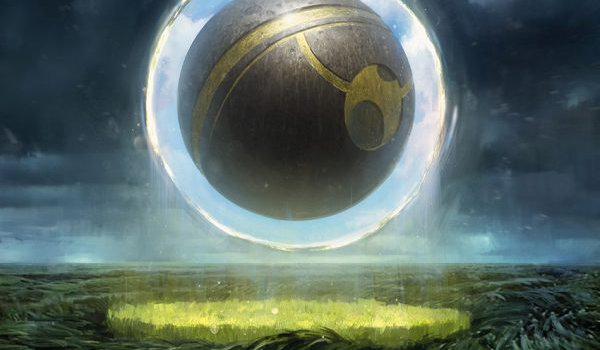
This one is particularly timely given what I said about Merfolk last week. I praised MissTrigger's deck for correctly understanding what mattered against Prowess and playing the right cards both maindeck and sideboard to win a Challenge. I've been stewing on this topic for a while, but what MissTrigger did is quite rare. It is far more common for players to attack decks incorrectly and/or sideboard the wrong hate cards. Why this happens depends case by case, but generally it comes down to failing to understand what's important, either to the targeted deck or to the overall matchup.
The former problem is almost always a case of mistaken causality. Humans are generally very bad at distinguishing correlation from causation because we're predisposed to fixating on the obvious thing as a survival mechanism. Some impressive thing happens in a match, and the loser's mind naturally assumes that thing determined the outcome of the match. But you should only ever focus on what matters. The failing is not knowing what matters, and when. I can't completely solve this problem, but I can outline common mistakes and provide advice to get around them.
The Sideboard Problem
While either mistake can happen at any time during a match, I find the more avoidable ones occur during sideboarding. It's not that game 1 is immune from players misunderstanding matchups. Rather, game 1, everyone has limited information and is thus prone to mistakes in identifying what's important. The only solution is extensive format knowledge, but even then you'll get surprised by rogue decks, weird card choices, and familiar decks played unexpected ways. It happens even to the best.
After game 1, players should have enough information to make informed decisions. However, there is a tendency for misidentification problems to manifest more in sideboarding than game 1. This usually comes down to fixating on certain "good" cards or interactions in a matchup while missing the actual context of that matchup. Consequently, I frequently see players misboard or worse, play the wrong type of hate in the first place. And it always costs them. The classic mistake is just playing the wrong card. I've shared this exchange before:
Me: Just in case what?
Them: If I hit Storm I need graveyard removal, so I have Surgical Extraction.
Me: I just saw you Extract Storm three times and you still lost handily.
Them: Yeah, Storm is a terrible matchup.
Me: Functionally unwinnable or unfavorable?
Them: Haven't won a match in weeks.
Me: Why are you using sideboard slots to try if it's unwinnable in the best case scenario?
Them: I need something against Storm.
This was a conversation I had with a Grixis Control player right before he left for an SCG tournament (2018 Regionals, I think). His deck was soul crushing against anything fair, but just couldn't beat combo. His problem was that, for all his answers, he could not win the game quickly. If memory serves, he won via Snapcaster Mage, Jace the Mind Sculptor, and Creeping Tar Pit. Nothing else. Storm was unbeatable for him not because he couldn't stop the combo, but because he couldn't win before Storm could rebuild from all his disruption. His solution was to play more answers for a specific aspect of Storm's attack, completely missing his actual problem in the matchup. A pair of Gurmag Anglers would have been better for the job.
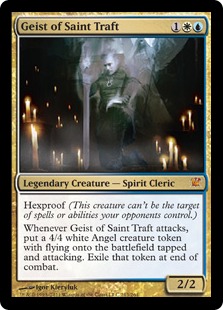 I've recommended shifts like this for control players before. I always have Geist of Saint Traft and Vendilion Clique when I play control for this very reason. Time matters in combo matchups, not card advantage. I recall winning on my Grixis player giving up Extraction, but I couldn't convince him to replace them with Anglers or indeed any other creatures for fear of diluting his control game. He didn't do well at his tournament after facing more combo than expected. You have to target the right interactions to win.
I've recommended shifts like this for control players before. I always have Geist of Saint Traft and Vendilion Clique when I play control for this very reason. Time matters in combo matchups, not card advantage. I recall winning on my Grixis player giving up Extraction, but I couldn't convince him to replace them with Anglers or indeed any other creatures for fear of diluting his control game. He didn't do well at his tournament after facing more combo than expected. You have to target the right interactions to win.
I realize that this sounds familiar to regular Beginner's Guide readers. However, what I'm specifically looking at is when you are targeting the right interaction, but still miss the mark. If you've fallen for correlation over causation or failed to understand a matchup, you may be playing relevant hate cards in the right matchup and still losing. This isn't because they're actually bad, but because you've missed something.
Target Misidentified
I'll explain this using something I did. Going to an early Modern PTQ in 2013-2014, I was locked into playing UW Sun Titan control. I knew that Twin was a hard matchup and needed to sideboard hate to win. I could deal with the overall deck on its own merits, but doing so left me vulnerable to being combo'd out, so I wanted something to stop that which didn't require a mana investment. My options were Suppression Field or Torpor Orb. Orb affected my value-creature plan, but completely shut down Twin. Meanwhile, the only cards that Field hit in my deck were Flooded Strand and Celestial Colonnade while hitting Twin's combo, fetchlands, and planeswalkers. It seemed like a much better plan to go with Field.
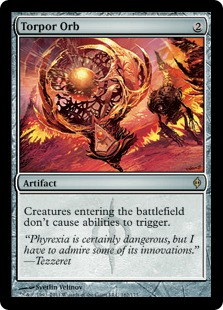 I was wrong. A more experienced player warned me before the tournament that I was, and should play Orb instead. I'd already lent out my Orbs, so I forged ahead and suffered. See, I'd fallen into the causality trap where I correlated the combo with losing. I was fixated on losing after fighting Twin to a stalemate and then getting combo'd out of nowhere. I was looking only to attack that angle. It didn't work because that's not the real reason I was losing. Twin was a tempo creature deck. It was heavily if not entirely dependent on its creatures actually gaining value when they hit. It's not like a 1/4, 2/1, or 2/1 flier is very impressive on its own. Especially against my 3/2's, 3/4 flier, or 6/6.
I was wrong. A more experienced player warned me before the tournament that I was, and should play Orb instead. I'd already lent out my Orbs, so I forged ahead and suffered. See, I'd fallen into the causality trap where I correlated the combo with losing. I was fixated on losing after fighting Twin to a stalemate and then getting combo'd out of nowhere. I was looking only to attack that angle. It didn't work because that's not the real reason I was losing. Twin was a tempo creature deck. It was heavily if not entirely dependent on its creatures actually gaining value when they hit. It's not like a 1/4, 2/1, or 2/1 flier is very impressive on its own. Especially against my 3/2's, 3/4 flier, or 6/6.
I successfully hated out the combo, but not the deck. Twin was able to just keep doing its thing, which was get under my slower control deck and then tempo me out. I did win a single game where a turn 2 Field locked out my opponent (only one non-fetchland), but I would have won many more if I'd played Orb and broken Twin's value engine. I had a much better medium-beatdown game than Twin. Because I missed what was really going on in the matchup, I played a hate card that let Twin escape. This is the lesson of this article: If you're going to play a hate card, make sure it actually hates out the target. Don't just kinda hate or be annoying. HATE THEM TO DEATH!
The Great Tron Problem
Over the years, this has been the great paradox of Modern Tron. Players have always complained about Tron, and have constantly proposed ways to fight against it. It never worked, until very recently. And it comes down to the incorrect target problem.
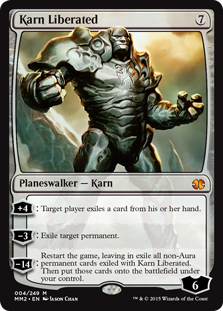 Tron wins by getting seven mana on turn three, then dropping big colorless bombs. Always has. This has led many to conclude that the key to beating the deck was to target the lands. The problem is that land destruction costs three or more. Which means that Tron can only be kept from hitting its mana when that Fulminator Mage comes down on curve on the play. Otherwise, there will be a Karn to deal with in addition to the lands. Players searched for years for a solution, but ultimately just always had to deal with the fact that Tron would hit its lands and drop bombs.
Tron wins by getting seven mana on turn three, then dropping big colorless bombs. Always has. This has led many to conclude that the key to beating the deck was to target the lands. The problem is that land destruction costs three or more. Which means that Tron can only be kept from hitting its mana when that Fulminator Mage comes down on curve on the play. Otherwise, there will be a Karn to deal with in addition to the lands. Players searched for years for a solution, but ultimately just always had to deal with the fact that Tron would hit its lands and drop bombs.
When Assassin's Trophy and Damping Sphere were printed, it was hailed as the end of Tron. Finally, there were effective answers that would definitely preempt Tron being assembled. However, that was far from the case. Tron kept powering on. It had to adapt by being mono-green and playing more basics, but it still just kept being Tron. The fact that this happened made many very unhappy.
Mooned Out
However, it shouldn't have been surprising given a well-known piece of advice: Blood Moon isn't good against Tron. It will just win through the Moon. Which is a very odd thought, seeing that Moon is the best land hate card available. It's devastating against Primeval Titan decks and unprepared three color decks. How could it be poor against Tron?
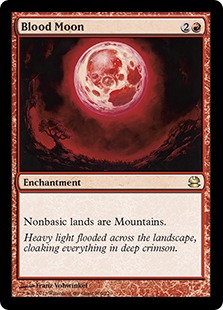 The answer was that Tron lands aren't the problem with Tron. Yes, they're the whole namesake of the deck, but the problem isn't that Tron ramps. The problem is that Tron drops big colorless monsters early. I realize that the former problem enables the other, but dealing with the former won't solve the latter. Too many players thought Moon was a solution to Tron, not realizing that Tron doesn't actually need colorless mana. Just generic mana, meaning red is just as good. Yes, Moon means that Tron can't hit those monsters early anymore, but there's nothing stopping Tron from hitting them later. And Karn Liberated is still a huge threat on turn seven. The problem isn't the Tron lands, the problem is Tron's threats.
The answer was that Tron lands aren't the problem with Tron. Yes, they're the whole namesake of the deck, but the problem isn't that Tron ramps. The problem is that Tron drops big colorless monsters early. I realize that the former problem enables the other, but dealing with the former won't solve the latter. Too many players thought Moon was a solution to Tron, not realizing that Tron doesn't actually need colorless mana. Just generic mana, meaning red is just as good. Yes, Moon means that Tron can't hit those monsters early anymore, but there's nothing stopping Tron from hitting them later. And Karn Liberated is still a huge threat on turn seven. The problem isn't the Tron lands, the problem is Tron's threats.
Players have finally started to catch on, and are adopting better strategies against Tron. Traditionally, blue control struggled against Tron, just like Jund. However, these days, control is playing more counters to actually answer Tron's answers on-curve. More importantly, Field of Ruin gives them a way to slow Tron down while fixing their own mana. This strategy has proven at least as effective as more dedicated strategies, and doesn't yield the heartbreak of land destruction not working. Except when Veil of Summer is involved.
Avoid the Monsters
On that note, stop boarding Damping Sphere against Eldrazi Tron! This is the most egregious example of players not understanding a matchup I know. E-Tron rarely hits Tron early. Frequently, it never has any acceleration at all. Playing Sphere protects against corner-case blowout games and nothing else. The reason that E-Tron works is that Chalice is a powerful card and the Eldrazi are big creatures. Far more than against Tron, attacking the lands is missing the point of the deck. Blood Moon is more effective here because E-Tron does need colorless mana, but that still won't help against a Waste. Only bring in hate cards that matter.
How Prowess Dodges Taxes
The second problem is missing the matchup context. Last week I mentioned that Thalia, Guardian of Thraben is poor against Prowess. This is not because her effect is bad against the deck; it can be utterly crippling when Prowess is mana-light. However, she's not effective because Lava Dart perfectly answers her. And can be flashed back later. Siding in Thalia is missing the important context of that matchup.
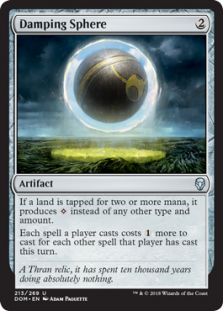 Worse is when players bring in Damping Sphere. The first spell isn't taxed, meaning that Prowess still gets to play its game. Not as much of it, and Sphere is still effective at preventing the explosive turns. As I learned against Izzet Phoenix, a smart player will be judicious with their spells so as to maximize their value and play around and through the Sphere. Unless you can really take advantage of it, the time that Sphere will buy is meaningless.
Worse is when players bring in Damping Sphere. The first spell isn't taxed, meaning that Prowess still gets to play its game. Not as much of it, and Sphere is still effective at preventing the explosive turns. As I learned against Izzet Phoenix, a smart player will be judicious with their spells so as to maximize their value and play around and through the Sphere. Unless you can really take advantage of it, the time that Sphere will buy is meaningless.
That same sideboard slot could go to Dragon's Claw and be more effective. Prowess plays a lot of red cards that don't directly deal damage. Getting an extra cushion of life buys more time than the ineffective taxing. It's not perfect, and Prowess absolutely will win through a Claw, but not quite as easily as a Sphere. Plus, Claw will never make it hard for its controller to cast multiple spells. While not the most effective Prowess hate (that would be Trinisphere), Claw's going after a more intrinsic part of the deck and is more effective than Sphere or any other taxing effect.
Storm's Dilemma
This brings up the question of taxing against any combo deck. And it is a complicated one. Taxing does generally work against these decks, but you can't rely on it. Storm plays cost reducer creatures, each of which undoes a Thalia or Thorn of Amethyst. This doesn't mean that Storm is suddenly free, since Modern Storm needs the cost reduction. However, it does mean that relying on taxing against Storm is risky. It's good as part of a wider attack (as Humans proved), but this isn't Legacy. If you want to really hate Storm, Deafening Silence or Trinisphere over Thorn.
Don't Overthink it
All that being said, don't overthink sideboard hate. It's possible to get too cute and level yourself. Basically, if a lengthy explanation/justification is necessary to explain why a card is effective, then it's better to opt for a simpler solution.
For a long time, I ran Plague Engineer in Humans. It made sense as a very powerful effect, and I'd been high on the card when it was spoiled. The problem was that Engineer is awkward to 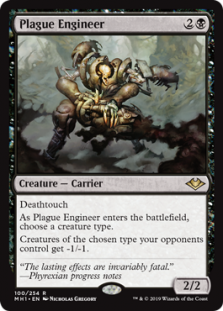 cast. The mana base is geared to only cast Humans, and I either had to save an Unclaimed Territory or draw Ancient Ziggurat/Aether Vial to actually play the thing. I've recently switched to Izzet Staticaster, and while it's not as powerful, it has been more effective because I cast it more often and easily. Theoretical power is meaningless if it's too hard to cast.
cast. The mana base is geared to only cast Humans, and I either had to save an Unclaimed Territory or draw Ancient Ziggurat/Aether Vial to actually play the thing. I've recently switched to Izzet Staticaster, and while it's not as powerful, it has been more effective because I cast it more often and easily. Theoretical power is meaningless if it's too hard to cast.
Similarly, the classics are classics for a reason. Sometimes it's best to just stick to normal cards rather than a powerful bullet or hate piece. Disenchant is the quintessential sideboard card. There are numerous more powerful, though narrow, options for the same effect. However, sometimes Disenchant is the best option. I've learned this the hard way in Legacy. Leonin Relic-Warden is a very strong card, especially when it answers Chalice of the Void, then gets flickered to take something else. However, it's linearly playing into Death and Taxes' ETB creature plan. This means that I've lost to Torpor Orb playing the Leonin when a simple Disenchant would win the game. Context is everything.
The Key
Sideboard space is a precious resource. Maximizing individual card impact is critical. However, so is ensuring that every card actually does the job it needs to do. Don't play a card because it seems good on paper. It must actually do the thing you're expecting to be worthwhile.



